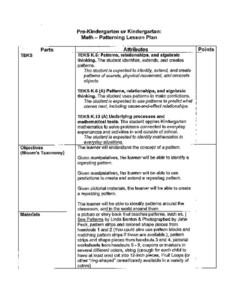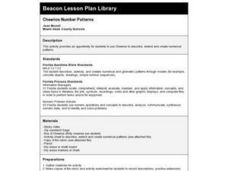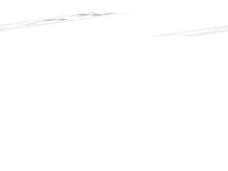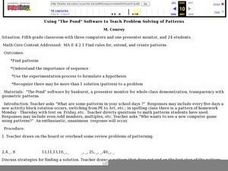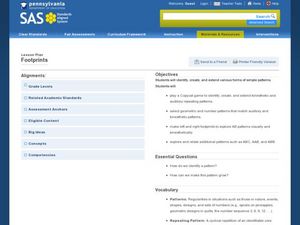Curated OER
Extending Geometric Patterns
Which square comes next? Each of these sequences is made up of patterned squares in a continuing order. Learners examine more squares to choose which one(s) would correctly continue the pattern. None of these have very complex sequences;...
Curated OER
Eating Patterns
Students sort through pictures of food to create patterns as they pertain to geometry. For this geometric patterns lesson, students relate to food as concrete objects that represent geometric patterns. Students recognize and describe the...
Curated OER
Patterning Lesson Plan
Open the eyes of young mathematicians to the patterns that are found everywhere in the world around them. After a shared reading of I See Patterns by Linda Benton, children complete a series of hands-on activities that teach them how to...
Curated OER
Patterns Everywhere!
Learners recognize and demonstrate the patterning of numbers and objects in our environment. They create a pattern using geometric shapes and find a missing number in a sequence.
Curated OER
Cheerios Number Patterns
Young scholars, following a provided worksheet, use Cheerios to explore number patterns.
Pennsylvania Department of Education
Analyzing Numeric and Geometric Patterns of Paper Pool
Students use concrete and pictorial representation of geometric patterns to extend patterns. In this geometric patterns lesson plan, students identify patterns and extend them.
K-5 Math Teaching Resources
Pattern Blocks
Who needs to buy pattern blocks when you have this printable pattern block template? Including triangles, squares, trapezoids, rhombuses, and hexagons, this resource offers endless possibilities for teaching children about geometric shapes.
PBS
Patterns to the Rescue!
Track down the Cyberchase episode that this lesson is associated with. Using a worksheet that is embedded in the plan, learners must find the next two numbers and shapes (a double pattern). Once these have been discovered, pupils try...
State of Michigan
Pre-K Mathematics
Kick-start children's education with this pre-school math unit. Offering 31 different hands-on learning activities that develop young mathematicians' pattern and shape recognition, basic number sense, and much more, this is a must-have...
National Security Agency
Growing Patterns: Practical Pattern Problems
Your learners explore growing patterns by describing, extending, creating, and evaluating practical pattern problems in this three-day collaborative unit. Beginning with concrete patterns and function tables to extend and describe with a...
Curated OER
Patterns
In this Algebra I worksheet, 9th graders explore number and geometric patterns and use the Sieve of Eratosthenes to find the prime numbers less than one hundred. The six page worksheet contains eight multipart questions. Answers are...
National Gallery of Canada
Counting Circles
Learners look at bands of colors and estimate how many rings of color there are. While working in groups, they come up with a plan of how to accurately count the rings. They attempt to find a pattern in the colors, and decide whether...
Virginia Department of Education
Relationships Round Robin
Mathematics is all about patterns. Young mathematicians analyze geometric patterns to write algebraic expressions. They use the expressions to predict future stages of the patterns.
Curated OER
Problem Solving of Patterns
Fifth graders use a software program to practice their problem solving skills. As a class, they identify patterns in their days at school and review problem solving patterns in math. They solve different problems and discover that the...
Virginia Department of Education
Arithmetic and Geometric Sequences
Future mathematicians learn about arithmetic and geometric sequences, as well as common ratios and differences as they complete a worksheet matching sequences with the algebraic expressions that represent them.
Curated OER
Using Geometric Shapes To Make Patterns
Sixth graders explore the use of shapes to create geometric patterns. they start with a simple example of dividing shapes in half to create two new ones. This can be extended to creating intricate patterns.
Inside Mathematics
Hexagons
Scholars find a pattern from a geometric sequence and write the formula for extending it. The worksheet includes a table to complete plus four analysis questions. It concludes with instructional implications for the teacher.
Curated OER
Extending Geometric and Numeric Patterns
Young scholars study patterns. They construct growing patterns using pattern blocks and isosceles right triangles. They verbally describe the patterns and state the rule that describes the relationship involving the number of pattern...
Curated OER
Visual and Number Patterns
Fourth graders develop strategies for identifying geometric and number patterns. In this mathematical patterns lesson, 4th graders use pattern blocks to make repeating patterns with numbers and shapes. Students then explore number...
Mathematics Vision Project
Geometric Figures
Logical thinking is at the forefront of this jam-packed lesson, with young mathematicians not only investigating geometric concepts but also how they "know what they know". Through each activity and worksheet, learners wrestle with...
Curated OER
Patterns Here, There, and Everywhere!
Upper graders access the Microsoft Word program and create patterns by utilizing certain keys on the keyboard. They create picket fences, smiley faces, and hearts. It seems that this lesson has as much to do with keyboarding skills as it...
Curated OER
Footprints
Students explore patterns. In this patterns geometry lesson, students identify and extend patterns including body parts, movement, geometric shapes, noises, and footprints. Students create and share an original pattern.
Curated OER
Patterns That Grow
Young scholars investigate growing patterns. In this additive patterns lesson, students analyze the core of growing patterns. Young scholars extend additive patterns based on the core.
Curated OER
Patterns
Fifth graders recognize shape and number patterns. In groups, 5th graders use strategies to find patterns. They extend the patterns and give explanations as to how they found the pattern. Students use the computer and the hundreds...




